过去将来时一般过去时中考经典题型带答案(1)
【英语】过去将来时一般过去时(1)
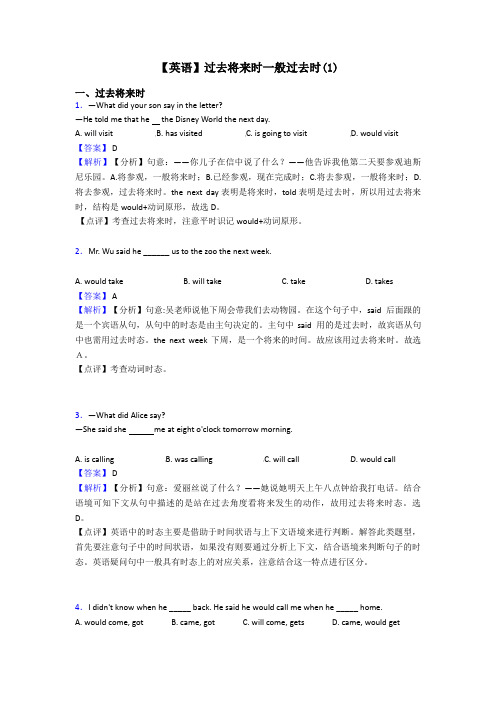
【英语】过去将来时一般过去时(1)一、过去将来时1.—What did your son say in the letter?—He told me that he the Disney World the next day.A. will visitB. has visitedC. is going to visitD. would visit【答案】 D【解析】【分析】句意:——你儿子在信中说了什么?——他告诉我他第二天要参观迪斯尼乐园。
A.将参观,一般将来时;B.已经参观,现在完成时;C.将去参观,一般将来时;D.将去参观,过去将来时。
the next day表明是将来时,told表明是过去时,所以用过去将来时,结构是would+动词原形,故选D。
【点评】考查过去将来时,注意平时识记would+动词原形。
2.Mr. Wu said he ______ us to the zoo the next week.A. would takeB. will takeC. takeD. takes【答案】 A【解析】【分析】句意:吴老师说他下周会带我们去动物园。
在这个句子中,said 后面跟的是一个宾语从句,从句中的时态是由主句决定的。
主句中said 用的是过去时,故宾语从句中也需用过去时态。
the next week 下周,是一个将来的时间。
故应该用过去将来时。
故选A。
【点评】考查动词时态。
3.—What did Alice say?—She said she me at eight o'clock tomorrow morning.A. is callingB. was callingC. will callD. would call【答案】 D【解析】【分析】句意:爱丽丝说了什么?——她说她明天上午八点钟给我打电话。
结合语境可知下文从句中描述的是站在过去角度看将来发生的动作,故用过去将来时态。
【英语】过去将来时一般过去时试题和答案

【英语】过去将来时一般过去时试题和答案一、过去将来时1.They made up their mind that they______ a new house once Larry changed jobs.A. boughtB. would buyC. have boughtD. had bought【答案】 B【解析】【分析】句意:他们打算只要Larry换了工作他们就买新房子。
once引导的是条件状语从句,根据主句将来时从句一般现在时的用法可知,从句一般过去时,主句应是一般将来时的过去时。
故答案选B。
【点评】考查动词时态,本题涉及过去将来时的应用。
2.—Would you like to go boating with me?—Sure.________A. I'd likeB. I'd loveC. I'll be gladD. I'd love to【答案】 D【解析】【分析】—你想与我一起去划船吗?—当然,我乐意去。
I'd like后缺少了to;I'd love后面同样缺少to;I'll be glad 后缺少to;原句中would like to do sth.是愿意去做某事,回答的时候用I'd love/like to。
故选D。
【点评】此题考查日常用语would like 的用法。
回答I'd like to 或I‘d love t o中to不能省略. 3.Too many people were absent. The chairperson warned that he the meeting if necessary.A. would cancelB. cancelledC. would startD. started【答案】 A【解析】【分析】句意:太多人缺席。
主持人警告说如果有必要的话他将取消这个会议。
过去将来时一般过去时知识点(大全)经典1

过去将来时一般过去时知识点(大全)经典1一、过去将来时1.He every penny he earned on books.A. would spendB. spendC. spentD. spends【答案】A【解析】【分析】句意:他经常把他赚的钱花在买书上面。
Would+动词原形,表示过去习惯性的动作,故选A。
【点评】考查would+动词原形表习惯性动作。
2.Mr. Wu said he ______ us to the zoo the next week.A. would takeB. will takeC. takeD. takes【答案】 A【解析】【分析】通过分析本句可知,本句是一个宾语从句。
根据next week可知,从句应该将来时,故排除CD;在宾语从句中,主句用过去时,则从句也应该用过去时的某种形式,故用would take。
所以本题选A。
【点评】对于宾语从句应该注意四点:1、语序:用陈述句语序;2、引导词:A.that B.特殊疑问词C.if/whether 3、时态:•当主句是一般现在时,从句的时态根据从句的时间变化‚当主句的时态是过去时时,从句应该用过去的某种时态ƒ当从句表示客观事实或客观真理等时,从句要用一般现在时。
4、人称:根据实际情况变换人称。
而本题只考查了时态。
3.—What did Alice say?—She said she me at eight o'clock tomorrow morning.A. is callingB. was callingC. will callD. would call【答案】 D【解析】【分析】句意:爱丽丝说了什么?——她说她明天上午八点钟给我打电话。
结合语境可知下文从句中描述的是站在过去角度看将来发生的动作,故用过去将来时态。
选D。
【点评】英语中的时态主要是借助于时间状语与上下文语境来进行判断。
解答此类题型,首先要注意句子中的时间状语,如果没有则要通过分析上下文,结合语境来判断句子的时态。
初三英语过去将来时句子转一般过去时练习题20题(带答案)
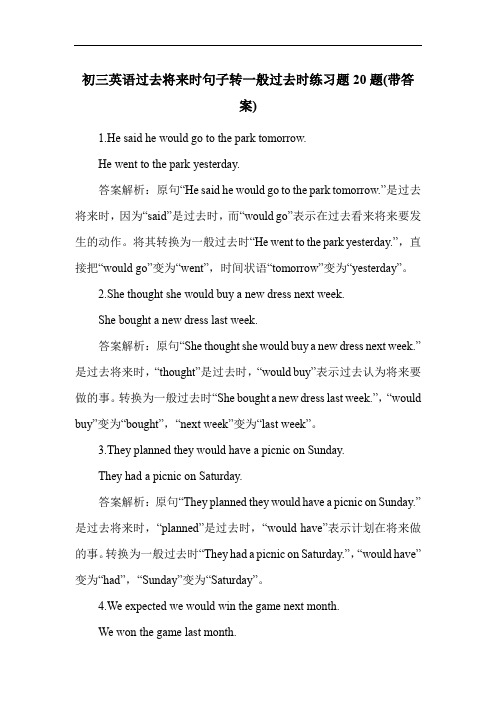
初三英语过去将来时句子转一般过去时练习题20题(带答案)1.He said he would go to the park tomorrow.He went to the park yesterday.答案解析:原句“He said he would go to the park tomorrow.”是过去将来时,因为“said”是过去时,而“would go”表示在过去看来将来要发生的动作。
将其转换为一般过去时“He went to the park yesterday.”,直接把“would go”变为“went”,时间状语“tomorrow”变为“yesterday”。
2.She thought she would buy a new dress next week.She bought a new dress last week.答案解析:原句“She thought she would buy a new dress next week.”是过去将来时,“thought”是过去时,“would buy”表示过去认为将来要做的事。
转换为一般过去时“She bought a new dress last week.”,“would buy”变为“bought”,“next week”变为“last week”。
3.They planned they would have a picnic on Sunday.They had a picnic on Saturday.答案解析:原句“They planned they would have a picnic on Sunday.”是过去将来时,“planned”是过去时,“would have”表示计划在将来做的事。
转换为一般过去时“They had a picnic on Saturday.”,“would have”变为“had”,“Sunday”变为“Saturday”。
中考考点_过去将来时一般过去时知识点汇总(全)经典
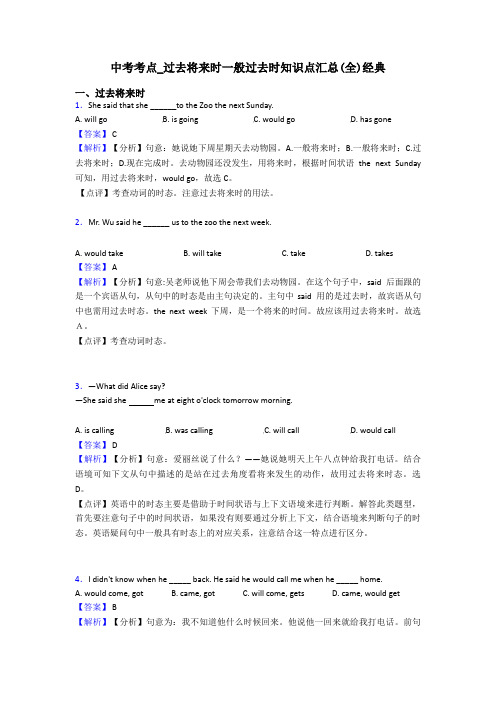
中考考点_过去将来时一般过去时知识点汇总(全)经典一、过去将来时1.She said that she ______to the Zoo the next Sunday.A. will goB. is goingC. would goD. has gone【答案】 C【解析】【分析】句意:她说她下周星期天去动物园。
A.一般将来时;B.一般将来时;C.过去将来时;D.现在完成时。
去动物园还没发生,用将来时,根据时间状语the next Sunday 可知,用过去将来时,would go,故选C。
【点评】考查动词的时态。
注意过去将来时的用法。
2.Mr. Wu said he ______ us to the zoo the next week.A. would takeB. will takeC. takeD. takes【答案】 A【解析】【分析】句意:吴老师说他下周会带我们去动物园。
在这个句子中,said 后面跟的是一个宾语从句,从句中的时态是由主句决定的。
主句中said 用的是过去时,故宾语从句中也需用过去时态。
the next week 下周,是一个将来的时间。
故应该用过去将来时。
故选A。
【点评】考查动词时态。
3.—What did Alice say?—She said she me at eight o'clock tomorrow morning.A. is callingB. was callingC. will callD. would call【答案】 D【解析】【分析】句意:爱丽丝说了什么?——她说她明天上午八点钟给我打电话。
结合语境可知下文从句中描述的是站在过去角度看将来发生的动作,故用过去将来时态。
选D。
【点评】英语中的时态主要是借助于时间状语与上下文语境来进行判断。
解答此类题型,首先要注意句子中的时间状语,如果没有则要通过分析上下文,结合语境来判断句子的时态。
英语疑问句中一般具有时态上的对应关系,注意结合这一特点进行区分。
中考英语一般过去时和一般将来时经典例题解析
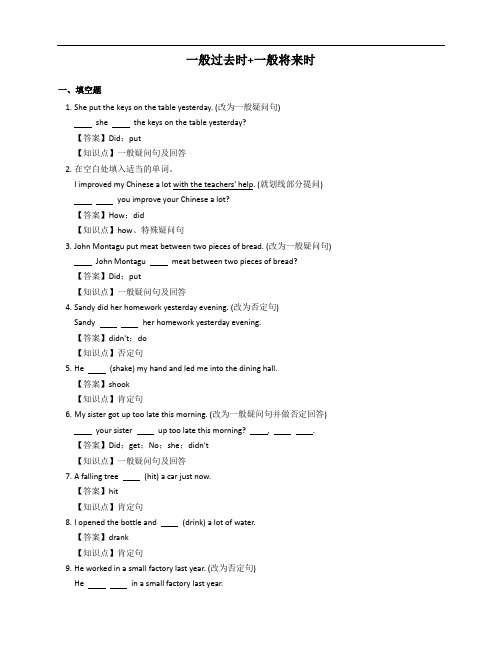
一般过去时+一般将来时一、填空题1.She put the keys on the table yesterday. (改为一般疑问句)she the keys on the table yesterday?【答案】Did;put【知识点】一般疑问句及回答2.在空白处填入适当的单词。
I improved my Chinese a lot with the teachers' help. (就划线部分提问)you improve your Chinese a lot?【答案】How;did【知识点】how、特殊疑问句3.John Montagu put meat between two pieces of bread. (改为一般疑问句)John Montagu meat between two pieces of bread?【答案】Did;put【知识点】一般疑问句及回答4.Sandy did her homework yesterday evening. (改为否定句)Sandy her homework yesterday evening.【答案】didn't;do【知识点】否定句5.He (shake) my hand and led me into the dining hall.【答案】shook【知识点】肯定句6.My sister got up too late this morning. (改为一般疑问句并做否定回答)your sister up too late this morning? , .【答案】Did;get;No;she;didn't【知识点】一般疑问句及回答7.A falling tree (hit) a car just now.【答案】hit【知识点】肯定句8.I opened the bottle and (drink) a lot of water.【答案】drank【知识点】肯定句9.He worked in a small factory last year. (改为否定句)He in a small factory last year.【答案】didn't;work【知识点】否定句10.A little bird (fly) in through the open window and she set it free at once.【答案】flew【知识点】肯定句11.Peter used to take risks when he was young. (改为一般疑问句)Peter to take risks when he was young?【答案】Did;use【解析】考查一般疑问句。
中考英语过去将来时练习题30题带答案解析

中考英语过去将来时练习题30题带答案解析1.She said she would go shopping if she had time.A.would goB.will goC.goesD.went答案解析:A。
本题考查过去将来时。
said 表明是过去,if 引导的条件状语从句用了had 过去式,主句用过去将来时would go。
B 选项will go 是一般将来时;C 选项goes 是一般现在时;D 选项went 是一般过去时。
2.He told me he would visit his grandparents the next day.A.would visitB.will visitC.visitsD.visited答案解析:A。
told 是过去时,the next day 在这里要用过去将来时would visit。
B 选项will visit 一般将来时;C 选项visits 一般现在时;D 选项visited 一般过去时。
3.They wondered if they would have a picnic on Sunday.A.would haveB.will haveC.haveD.had答案解析:A。
wondered 是过去时,if 引导的宾语从句表示将来的动作要用过去将来时would have。
B 选项will have 一般将来时;C 选项have 一般现在时;D 选项had 一般过去时或过去完成时。
4.I thought she would come to my party.A.would comeB.will comeesD.came答案解析:A。
thought 是过去时,后面的宾语从句表示将来的动作要用过去将来时would come。
B 选项will come 一般将来时;C 选项comes 一般现在时;D 选项came 一般过去时。
5.We knew he would finish his homework soon.A.would finishB.will finishC.finishesD.finished答案解析:A。
中考英语八大时态测试题(含答案)
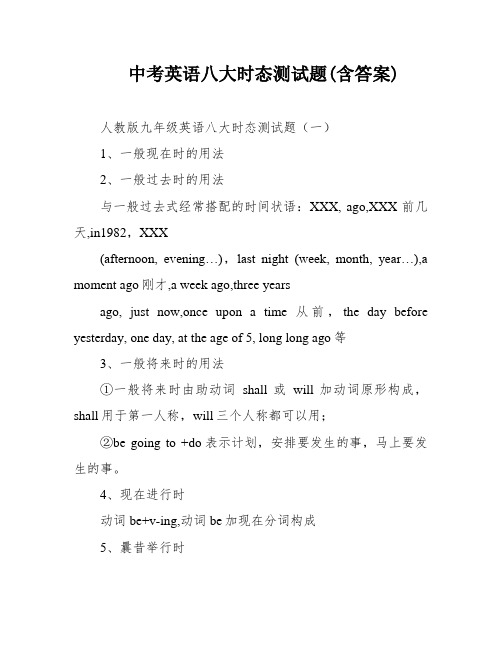
中考英语八大时态测试题(含答案)人教版九年级英语八大时态测试题(一)1、一般现在时的用法2、一般过去时的用法与一般过去式经常搭配的时间状语:XXX, ago,XXX前几天,in1982,XXX(afternoon, evening…),last night (week, month, year…),a moment ago刚才,a week ago,three yearsago, just now,once upon a time从前,the day before yesterday, one day, at the age of 5, long long ago等3、一般将来时的用法①一般将来时由助动词shall或will加动词原形构成,shall用于第一人称,will三个人称都可以用;②be going to +do表示计划,安排要发生的事,马上要发生的事。
4、现在进行时动词be+v-ing,动词be加现在分词构成5、曩昔举行时与过去进行时搭配的时间状语:(just)then那时,当时;XXX在这/那时XXX今世界战书;at nine在九点;last night昨晚;(at)this time XXX在今天这个时分但在很多情形下,没有透露表现工夫的状语,这时候需求经由过程高低文来透露表现。
6、过去将来时构成:一般过去将来时由should或would加动词原形构成,第一人称用should,其他人称用would,第一人称也能够用would.容身于曩昔某一时辰,从曩昔看将要产生的工作,经常使用于宾语从句中。
与曩昔未来时搭配的时间状语:the next day(morning, year…), the following month(week…)等7、现在完成时组成:目前完成时态是由“助动词have(has)+曩昔分词”组成,标记词:for, since, since…ago,yet8、过去完成时实战模仿()1. There _______ XXX.A. XXX()2. --- Who sings best in your class?--- Jenny _______.1XXX done()3. --- _____ the young girl _____ the old man clean his room every day?--- Yes, she does.A. Does; XXX; XXX; helpD. Do; helps()4. --- Can I go to Beijing for my holiday, Dad?--- You can when you _______ a bit older.A. will XXX()5. --- What does Linda often do in the evening?--- She often ____ her homework, but on the evening of March 12 she____TV.A. does; watchesB. is doing; watchedC. does; watchedD. is doing; was watching()6. XXX __around the sun.A. XXX()7. If he _______harder, he will catch up with us soon.A. XXX()8. --- Don’t forget to ask him to write to me.--- I won’t. As soon as he _____, I’ll ask him to write to you.A. XXX coming()9. --- Do you like this silk dress?--- Yes, I do. It _______ so soft and comfortable.A. is XXX felt()10. Oh, it’s you. I’m sorry I _______ know you _______ here.A. don’t; areB. didn’t; XXX’t; XXX’t; were() 11. XXX?2A. XXX() XXX XXX.A. XXX() 13. Some arein the XXX.A. swiming, playingB. swimming, plaiingC. swimming, playingD. swimming, plaing() 14.---Where is Dick?--- Heto the reading-room.A. has XXX() 15. Mark Twain, an American writer,XXX.A. knowsB. is known asC. is known toD. is known for () 16. I hope he will come to see me before XXX.A. XXX left() XXX.A. XXX() 18. I think sheright now.A. XXX readingD. read() 19. ---- Where are the children?---- Theya good time in the garden.A. XXX() 20. ----- Wheremy glasses? I can’t find them.---- Ithem on the bookshelf, XXX.A. you put, putB. you have put, have putC. have you put, putD. did you put, have put3() 21. When the police arrived, the manfor 10 minutes. A. diedB. was deathC. had diedD. had been dead() 22. By the time this talk is over, wea lot about the earth.A. will be XXX have learnt()23. XXX difficulties.A. helpedB. will helpC. helpD. were going to help() 24. ----Have you seen him today? ----Yes, Ihim this morning.A. has XXX() 25. Heworried when he heard this news.A. XXX() 26. XXX.A. XXX do()27. I don’t think that it’s true. He’XXX.A. XXX() 28. Have XXX Farm?A. XXX() 29. XXX?A. has, borrowedB. has, keptC. has, lentD. is, using() 30. Heto do this lessons at eight every evening.A. XXX() 31. XXX.A. are going to hasB. is going to haveC. are havingD. are going to have() XXX.A. XXX4() 33.heon well with his friends this term?A. Does, getsB. Does, getC. Is, gettingD. Is, geting() XXX? I can’t find it.A. XXX() XXX Saturday?A. XXX play() 36. The childrenat school now.A. XXX()XXX stories, but hea TV play these days.A. is writing, is writingB. is writing, writesC. writes, is writingD. writes, writes() 38. He said hethe league(联盟) for two years.A. has joinedB. has been inC. had been inD. joined() 39. XXX garden,she?A. XXX’t() 40. Whatyouto do to keep the room clean?A. do, haveB. does, haveC. did, haveD. are, have() 41. Some flowersby XXX already.A. have been XXX()42. When winter comes, XXX.A. are going toB. willC. will beD. would() 43. Ito the XXX.A. go, goB. am going, goC. go, am goingD. am going, am going() XXX future now,you?A. don’t think, XXX, aren’t5XXX, doD. aren’t thinking, are()45. XXX hehis way.A. would lostB. would loseC. is going toD. shall lose() 46. Weeach other since he left here.A. XXX’t XXX seen() 47. Mr. Smithout for a walk in the park every day.A. XXX go() 48. Hefrom home for a long time.A. has gone awayB. had gone awayC. has leftD. has been away()49. You mustn’t go too high, or youdangerous.A. will beB. areC. would beD. is going to() 50. We have known each other.A. since we were youngB. after we were youngC. when we are youngD. if we are young() 51. XXX work.A. XXX. is going to() 52. How long has this shop?A. be XXX() 53. Mr. Smithhere since he moved to his city.A. had XXX has lived()54. ----Have you read the newspaper?----No, I XXX’t.A. XXX()55. Our knowledge of the universeall the time. 6A. XXX() 56. She won’t go to the XXX.A. XXX()57. XXX.A. has been deadB. was deadC. has diedD. died() 58. Sheto the Great Wall several times.A. goesB. has goneC. wentD. has been() 59. XXX.A. XXX() 60. XXX book.A. XXX()61. Ithe bike for over four years.A. XXX()62. XXX.A. had visitedB. has visitedC. will visitD. would visit() 63. His motherthe Party last year. Shea Party member for a year.A. joined, wasB. has joined, isC. joined, has beenD. has joined, has been() 64. We don’t know if itthe day after tomorrow.A. XXX rain() 65. He said hehis life for his country.A. XXX givenD. would give()66. XXX.A. goB. goesC. wentD. is going() 67. Look, the XXX.7A. XXX() 68. Hein this school in 1958.A. XXX() XXX.A. will XXX() 70. XXX work in two days.A. had XXX finish()71. By the end of last week, XXX.A. would learnB. have learnedC. had learnedD. were learning () 72. When he left, his mother.A. XXX() 73. We’ll go to play with snow if XXX.A. XXX() XXX.A. XXX() 75. The trainwhen we got to the XXX.A. has just leftB. had just leftC. leavesD. left() 76. Dr Smith is not at home. Heto work.A. has goneB. has beenC. had beenD. had gone() 77. That man knows a lot about New York. I heard hebefore.A. had gone to the cityB. had been in thereC. had been thereD. had been New York() 78. The artistto Europe. He is there now.A. has goneB. has beenC. had goneD. had been8() 79. Miss Brown said XXX China before.A. has, goneB. has, beenC. had, goneD. had, been() XXX?A. is, doingB. was, doingC. did, doD. had, done() 81. Ito see the film because I have XXX.A. XXX’t gone() 82. The students will have a football match if XXX.A. will beB. would beC. wasD. is() 83. She asked me if Ithe story before.A. have readB. had readC. would readD. will read() XXX?A. are, doingB. did, doC. have, doneD. were, doing() 85. You can’t see him now because XXX.A. XXX having() XXX.A. XXX’t XXX() 87. Li Ping will visit the Great Wall as soon as hefree.A. will beB. isC. wasD. has been() 88. One day when Ithe post office Imy uncle.A. pass, seeB. was passing, sawC. passed, sawD. pass, saw () XXX.A. said, will makeB. said, madeC. said, had madeD. said, make() XXX.9A. are, haveB. were, haveC. were, to haveD. are, having () XXX.A. XXX. take a walkD. is taking a walk() 92. Mary is seven years old. Sheeight next year.A. XXX be() 93. A table and many XXX.A. wasB. wereC. are beingD. was being() 94. I’ll go with you as soon as Imy work.A. will XXX() 95. Treesgreen in spring.A. XXX XXX() 96. XXX Iin bed all day because I had a fever.A. XXX() 97. Hello, Mike. It’s you. Iyouin Beijing. How long have you been here?A. don’t know, XXX’t know, areC. XXX, areD. XXX’t know, were() 98. A: Whenagain? B: When he. I’ll let you know.A. he comes, comesB. will be come, will comeC. he comes, will comeD. will he come, comes() 99. The last bus. I had to walk home.A. had goneB. have goneC. wentD. has gone() 100. A: Are you making cakes?B:.A. Yes, I doB. Yes, I amC. Yes, I’mD. Yes, I’m making10()101. ----What time?----My watch.A. it is, stoppedB. is it, has stoppedC. it is, has stoppedD. is it, is stopping() 102. Whaton Sunday?A. does he sometimes doB. is he often doingC. has he doneD. is usually he do()XXX night?A. XXX, XXX, watchingC. XXX, XXX, XXX() 104. That Japanese knowsthe Salt Lake City. I XXX.A. a lot of, had been thereB. a lot about, had been thereC. lot, had been thereD. a lot of, had gone there() 105. As soon as we saw his face, XXX.A. XXX, wasB. know, wereC. know, wasD. know, were11参考答案1-10:DCABCDBCBC11-20:ABCCCBBCAC21-30:DDDDBDBDBD31-40:DCBCABCBAA。
初三英语过去将来时句子转一般过去时练习题30题答案解析版
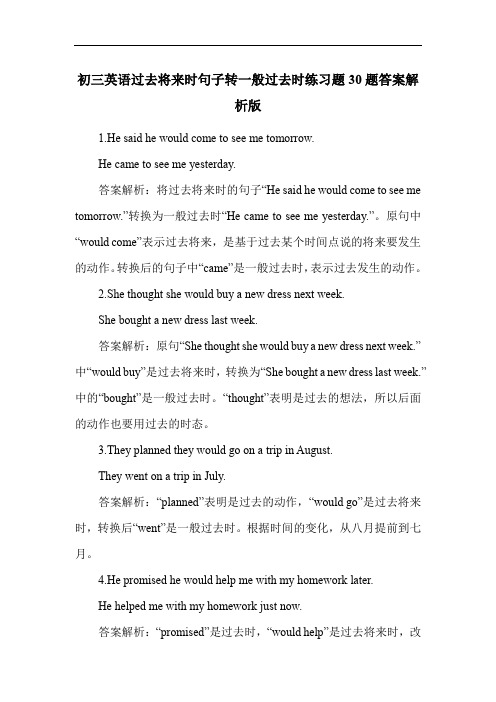
初三英语过去将来时句子转一般过去时练习题30题答案解析版1.He said he would come to see me tomorrow.He came to see me yesterday.答案解析:将过去将来时的句子“He said he would come to see me tomorrow.”转换为一般过去时“He came to see me yesterday.”。
原句中“would come”表示过去将来,是基于过去某个时间点说的将来要发生的动作。
转换后的句子中“came”是一般过去时,表示过去发生的动作。
2.She thought she would buy a new dress next week.She bought a new dress last week.答案解析:原句“She thought she would buy a new dress next week.”中“would buy”是过去将来时,转换为“She bought a new dress last week.”中的“bought”是一般过去时。
“thought”表明是过去的想法,所以后面的动作也要用过去的时态。
3.They planned they would go on a trip in August.They went on a trip in July.答案解析:“planned”表明是过去的动作,“would go”是过去将来时,转换后“went”是一般过去时。
根据时间的变化,从八月提前到七月。
4.He promised he would help me with my homework later.He helped me with my homework just now.答案解析:“promised”是过去时,“would help”是过去将来时,改为“helped”一般过去时。
过去将来时一般过去时知识点(大全)(word)(1)

过去将来时一般过去时知识点(大全)(word)(1)一、过去将来时1.He after supper a couple of years ago.A. smokedB. would smokeC. smokesD. will smoke【答案】B【解析】【分析】句意:几年前他吃完饭就吸烟。
a couple of years ago是过去时的时间状语,吸烟是吃完饭之后发生的事情,would+过去原形,表示过去习惯性的动作。
故选B。
【点评】考查would+动词原形表习惯性动作。
2.I didn't know when he _____ back. He said he would call me when he _____ home.A. would come, gotB. came, gotC. will come, getsD. came, would get【答案】 B【解析】【分析】句意为:我不知道他什么时候回来。
他说他一回来就给我打电话。
前句是when引导的宾语从句,根据语境应用一般过去时。
后句是when引导的时间状语从句,主句用过去将来时,从句用一般过去时。
故选B。
【点评】考查从句的时态。
3.—Would you like to go boating with me?—Sure.________A. I'd likeB. I'd loveC. I'll be gladD. I'd love to【答案】 D【解析】【分析】—你想与我一起去划船吗?—当然,我乐意去。
I'd like后缺少了to;I'd love后面同样缺少to;I'll be glad 后缺少to;原句中would like to do sth.是愿意去做某事,回答的时候用I'd love/like to。
故选D。
【点评】此题考查日常用语would like 的用法。
中考英语过去将来时一般过去时20篇(附带答案解析)(1)
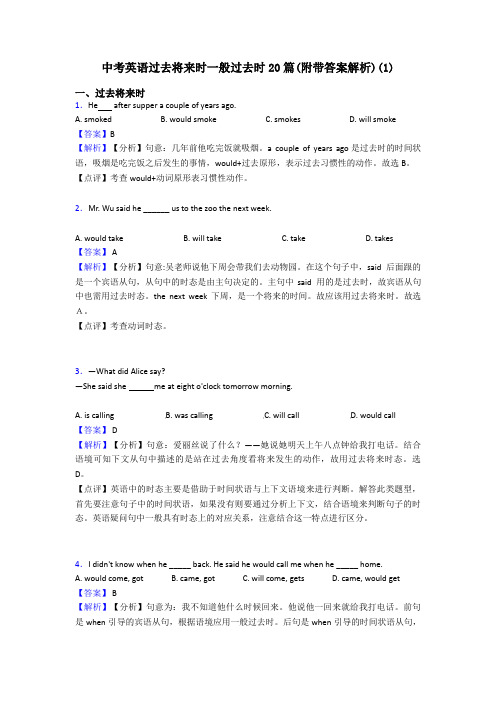
中考英语过去将来时一般过去时20篇(附带答案解析)(1)一、过去将来时1.He after supper a couple of years ago.A. smokedB. would smokeC. smokesD. will smoke【答案】B【解析】【分析】句意:几年前他吃完饭就吸烟。
a couple of years ago是过去时的时间状语,吸烟是吃完饭之后发生的事情,would+过去原形,表示过去习惯性的动作。
故选B。
【点评】考查would+动词原形表习惯性动作。
2.Mr. Wu said he ______ us to the zoo the next week.A. would takeB. will takeC. takeD. takes【答案】 A【解析】【分析】句意:吴老师说他下周会带我们去动物园。
在这个句子中,said 后面跟的是一个宾语从句,从句中的时态是由主句决定的。
主句中said 用的是过去时,故宾语从句中也需用过去时态。
the next week 下周,是一个将来的时间。
故应该用过去将来时。
故选A。
【点评】考查动词时态。
3.—What did Alice say?—She said she me at eight o'clock tomorrow morning.A. is callingB. was callingC. will callD. would call【答案】 D【解析】【分析】句意:爱丽丝说了什么?——她说她明天上午八点钟给我打电话。
结合语境可知下文从句中描述的是站在过去角度看将来发生的动作,故用过去将来时态。
选D。
【点评】英语中的时态主要是借助于时间状语与上下文语境来进行判断。
解答此类题型,首先要注意句子中的时间状语,如果没有则要通过分析上下文,结合语境来判断句子的时态。
英语疑问句中一般具有时态上的对应关系,注意结合这一特点进行区分。
4.I didn't know when he _____ back. He said he would call me when he _____ home.A. would come, gotB. came, gotC. will come, getsD. came, would get【答案】 B【解析】【分析】句意为:我不知道他什么时候回来。
【英语】过去将来时一般过去时综合分类解析(1)
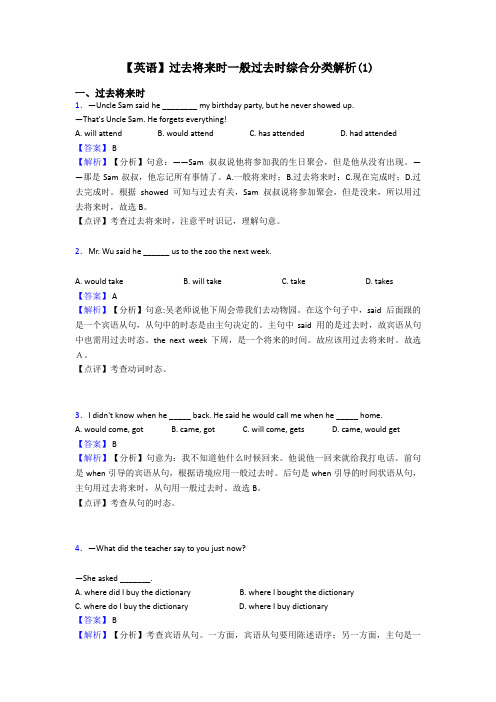
【英语】过去将来时一般过去时综合分类解析(1)一、过去将来时1.—Uncle Sam said he ________ my birthday party, but he never showed up.—That's Uncle Sam. He forgets everything!A. will attendB. would attendC. has attendedD. had attended【答案】 B【解析】【分析】句意:——Sam叔叔说他将参加我的生日聚会,但是他从没有出现。
——那是Sam叔叔,他忘记所有事情了。
A.一般将来时;B.过去将来时;C.现在完成时;D.过去完成时。
根据showed可知与过去有关,Sam叔叔说将参加聚会,但是没来,所以用过去将来时,故选B。
【点评】考查过去将来时,注意平时识记,理解句意。
2.Mr. Wu said he ______ us to the zoo the next week.A. would takeB. will takeC. takeD. takes【答案】 A【解析】【分析】句意:吴老师说他下周会带我们去动物园。
在这个句子中,said 后面跟的是一个宾语从句,从句中的时态是由主句决定的。
主句中said 用的是过去时,故宾语从句中也需用过去时态。
the next week 下周,是一个将来的时间。
故应该用过去将来时。
故选A。
【点评】考查动词时态。
3.I didn't know when he _____ back. He said he would call me when he _____ home.A. would come, gotB. came, gotC. will come, getsD. came, would get【答案】 B【解析】【分析】句意为:我不知道他什么时候回来。
他说他一回来就给我打电话。
前句是when引导的宾语从句,根据语境应用一般过去时。
【英语】过去将来时一般过去时经典
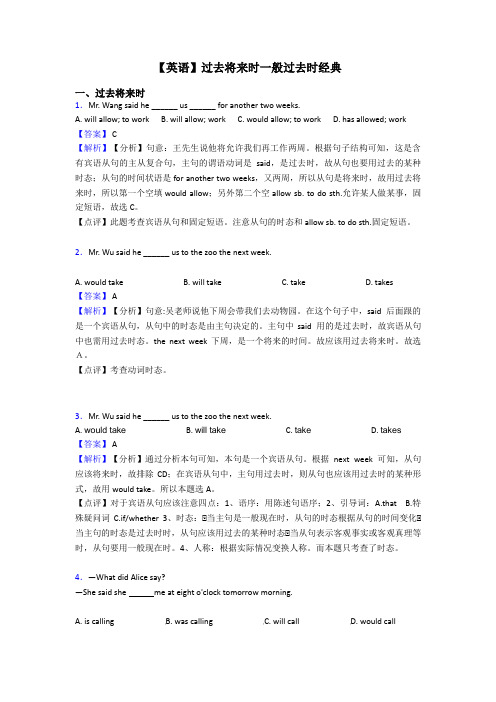
【英语】过去将来时一般过去时经典一、过去将来时1.Mr. Wang said he ______ us ______ for another two weeks.A. will allow; to workB. will allow; workC. would allow; to workD. has allowed; work 【答案】 C【解析】【分析】句意:王先生说他将允许我们再工作两周。
根据句子结构可知,这是含有宾语从句的主从复合句,主句的谓语动词是said,是过去时,故从句也要用过去的某种时态;从句的时间状语是for another two weeks,又两周,所以从句是将来时,故用过去将来时,所以第一个空填would allow;另外第二个空allow sb. to do sth.允许某人做某事,固定短语,故选C。
【点评】此题考查宾语从句和固定短语。
注意从句的时态和allow sb. to do sth.固定短语。
2.Mr. Wu said he ______ us to the zoo the next week.A. would takeB. will takeC. takeD. takes【答案】 A【解析】【分析】句意:吴老师说他下周会带我们去动物园。
在这个句子中,said 后面跟的是一个宾语从句,从句中的时态是由主句决定的。
主句中said 用的是过去时,故宾语从句中也需用过去时态。
the next week 下周,是一个将来的时间。
故应该用过去将来时。
故选A。
【点评】考查动词时态。
3.Mr. Wu said he ______ us to the zoo the next week.A. would takeB. will takeC. takeD. takes【答案】 A【解析】【分析】通过分析本句可知,本句是一个宾语从句。
根据next week可知,从句应该将来时,故排除CD;在宾语从句中,主句用过去时,则从句也应该用过去时的某种形式,故用would take。
过去将来时一般过去时综合测试(含答案)1

过去将来时一般过去时综合测试(含答案)1一、过去将来时1.—What did your son say in the letter?—He told me that he the Disney World the next day.A. will visitB. has visitedC. is going to visitD. would visit【答案】 D【解析】【分析】句意:——你儿子在信中说了什么?——他告诉我他第二天要参观迪斯尼乐园。
A.将参观,一般将来时;B.已经参观,现在完成时;C.将去参观,一般将来时;D.将去参观,过去将来时。
the next day表明是将来时,told表明是过去时,所以用过去将来时,结构是would+动词原形,故选D。
【点评】考查过去将来时,注意平时识记would+动词原形。
2.Mr. Wu said he ______ us to the zoo the next week.A. would takeB. will takeC. takeD. takes【答案】 A【解析】【分析】通过分析本句可知,本句是一个宾语从句。
根据next week可知,从句应该将来时,故排除CD;在宾语从句中,主句用过去时,则从句也应该用过去时的某种形式,故用would take。
所以本题选A。
【点评】对于宾语从句应该注意四点:1、语序:用陈述句语序;2、引导词:A.that B.特殊疑问词C.if/whether 3、时态:•当主句是一般现在时,从句的时态根据从句的时间变化‚当主句的时态是过去时时,从句应该用过去的某种时态ƒ当从句表示客观事实或客观真理等时,从句要用一般现在时。
4、人称:根据实际情况变换人称。
而本题只考查了时态。
3.Tim told us that his company ______ robots to do some of the work.A. usesB. will useC. has usedD. would use【答案】 D【解析】【分析】句意:蒂姆告诉过我,他的公司会使用机器人做工作的一部分。
中考英语过去将来时一般过去时100篇及答案经典1

中考英语过去将来时一般过去时100篇及答案经典1一、过去将来时1.At college, Barack Obama didn't know that he ______ the first black president of the United States of America.A. was to becomeB. becomesC. is to becomeD. became【答案】 A【解析】【分析】句意:在大学的时候,奥巴马不知道他将成为美国第一个黑人总统。
用过去将来时表示过去某个时间将要发生的事情,所以选A。
【点评】英语中的时态主要由动词的形式决定,因此在学习英语时态时,要注意分析动词形式及具体语境,想象在那个特定的时间动作所发生的背景,这个动作是经常性动作、一般性动作、进行性动作、完成性动作还是将要发生的动作。
这题的解题关键是didn’t know。
2.I didn't know when he _____ back. He said he would call me when he _____ home.A. would come, gotB. came, gotC. will come, getsD. came, would get【答案】 B【解析】【分析】句意为:我不知道他什么时候回来。
他说他一回来就给我打电话。
前句是when引导的宾语从句,根据语境应用一般过去时。
后句是when引导的时间状语从句,主句用过去将来时,从句用一般过去时。
故选B。
【点评】考查从句的时态。
3.—What did the teacher say to you just now?—She asked _______.A. where did I buy the dictionaryB. where I bought the dictionaryC. where do I buy the dictionaryD. where I buy dictionary【答案】 B【解析】【分析】考查宾语从句。
【英语】 过去将来时一般过去时练习题(含答案)经典
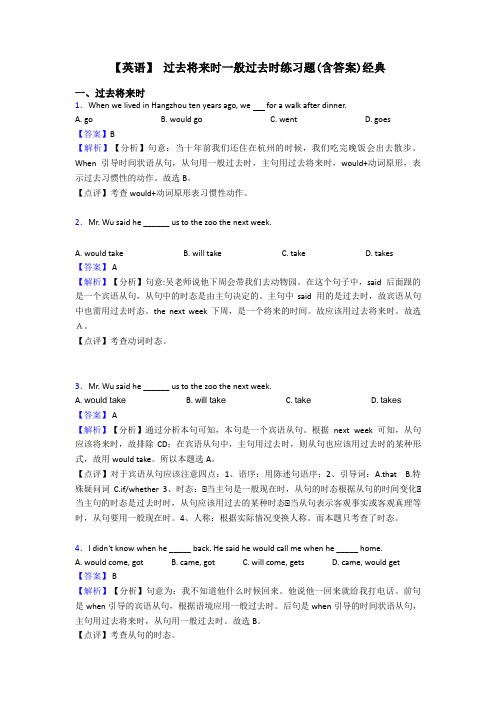
【英语】过去将来时一般过去时练习题(含答案)经典一、过去将来时1.When we lived in Hangzhou ten years ago, we for a walk after dinner.A. goB. would goC. wentD. goes【答案】B【解析】【分析】句意:当十年前我们还住在杭州的时候,我们吃完晚饭会出去散步。
When引导时间状语从句,从句用一般过去时,主句用过去将来时,would+动词原形,表示过去习惯性的动作。
故选B。
【点评】考查would+动词原形表习惯性动作。
2.Mr. Wu said he ______ us to the zoo the next week.A. would takeB. will takeC. takeD. takes【答案】 A【解析】【分析】句意:吴老师说他下周会带我们去动物园。
在这个句子中,said 后面跟的是一个宾语从句,从句中的时态是由主句决定的。
主句中said 用的是过去时,故宾语从句中也需用过去时态。
the next week 下周,是一个将来的时间。
故应该用过去将来时。
故选A。
【点评】考查动词时态。
3.Mr. Wu said he ______ us to the zoo the next week.A. would takeB. will takeC. takeD. takes【答案】 A【解析】【分析】通过分析本句可知,本句是一个宾语从句。
根据next week可知,从句应该将来时,故排除CD;在宾语从句中,主句用过去时,则从句也应该用过去时的某种形式,故用would take。
所以本题选A。
【点评】对于宾语从句应该注意四点:1、语序:用陈述句语序;2、引导词:A.that B.特殊疑问词C.if/whether 3、时态:•当主句是一般现在时,从句的时态根据从句的时间变化‚当主句的时态是过去时时,从句应该用过去的某种时态ƒ当从句表示客观事实或客观真理等时,从句要用一般现在时。
过去将来时一般过去时知识点总结(word)(1)

过去将来时一般过去时知识点总结(word)(1)一、过去将来时1.He after supper a couple of years ago.A. smokedB. would smokeC. smokesD. will smoke【答案】B【解析】【分析】句意:几年前他吃完饭就吸烟。
a couple of years ago是过去时的时间状语,吸烟是吃完饭之后发生的事情,would+过去原形,表示过去习惯性的动作。
故选B。
【点评】考查would+动词原形表习惯性动作。
2.—What did your son say in the letter?—He told me that he __________ the Great Wall the next day.A. will visitB. has visitedC. is going to visitD. would visit【答案】 D【解析】【分析】句意:你的儿子在信中说什么?他告诉我他第二天要去参观长城.结合语境可知从句描述的是站在过去角度看将来发生的动作,故用过去将来时态,故选D.【点评】英语中的时态主要是借助于时间状语与上下文语境来进行判断。
解答此类题型,首先要注意句子中的时间状语,如果没有则要通过分析上下文,结合语境来判断句子的时态。
英语疑问句中一般具有时态上的对应关系,注意结合这一特点进行区分。
3.Mr. Wu said he ______ us to the zoo the next week.A. would takeB. will takeC. takeD. takes【答案】 A【解析】【分析】句意:吴老师说他下周会带我们去动物园。
在这个句子中,said 后面跟的是一个宾语从句,从句中的时态是由主句决定的。
主句中said 用的是过去时,故宾语从句中也需用过去时态。
the next week 下周,是一个将来的时间。
故应该用过去将来时。
【英语】过去将来时一般过去时知识点总结及经典习题(含答案)(word)
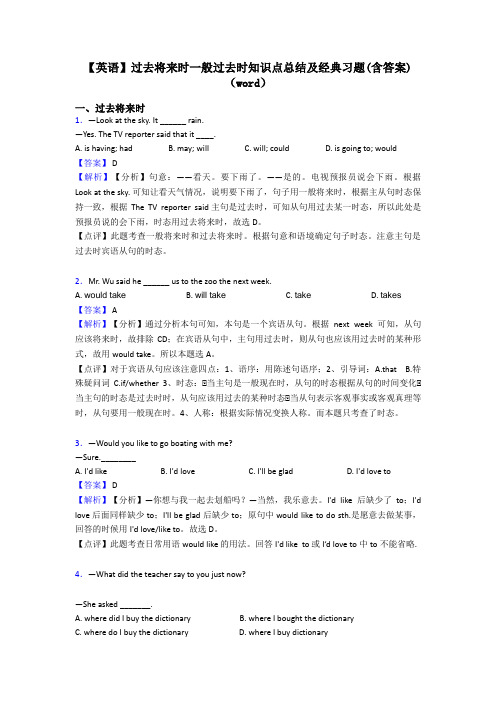
【英语】过去将来时一般过去时知识点总结及经典习题(含答案)(word)一、过去将来时1.—Look at the sky. It ______ rain.—Yes. The TV reporter said that it ____.A. is having; hadB. may; willC. will; couldD. is going to; would【答案】 D【解析】【分析】句意:——看天。
要下雨了。
——是的。
电视预报员说会下雨。
根据Look at the sky. 可知让看天气情况,说明要下雨了,句子用一般将来时,根据主从句时态保持一致,根据The TV reporter said主句是过去时,可知从句用过去某一时态,所以此处是预报员说的会下雨,时态用过去将来时,故选D。
【点评】此题考查一般将来时和过去将来时。
根据句意和语境确定句子时态。
注意主句是过去时宾语从句的时态。
2.Mr. Wu said he ______ us to the zoo the next week.A. would takeB. will takeC. takeD. takes【答案】 A【解析】【分析】通过分析本句可知,本句是一个宾语从句。
根据next week可知,从句应该将来时,故排除CD;在宾语从句中,主句用过去时,则从句也应该用过去时的某种形式,故用would take。
所以本题选A。
【点评】对于宾语从句应该注意四点:1、语序:用陈述句语序;2、引导词:A.that B.特殊疑问词C.if/whether 3、时态:•当主句是一般现在时,从句的时态根据从句的时间变化‚当主句的时态是过去时时,从句应该用过去的某种时态ƒ当从句表示客观事实或客观真理等时,从句要用一般现在时。
4、人称:根据实际情况变换人称。
而本题只考查了时态。
3.—Would you like to go boating with me?—Sure.________A. I'd likeB. I'd loveC. I'll be gladD. I'd love to【答案】 D【解析】【分析】—你想与我一起去划船吗?—当然,我乐意去。
过去将来时一般过去时知识点(大全)(1)
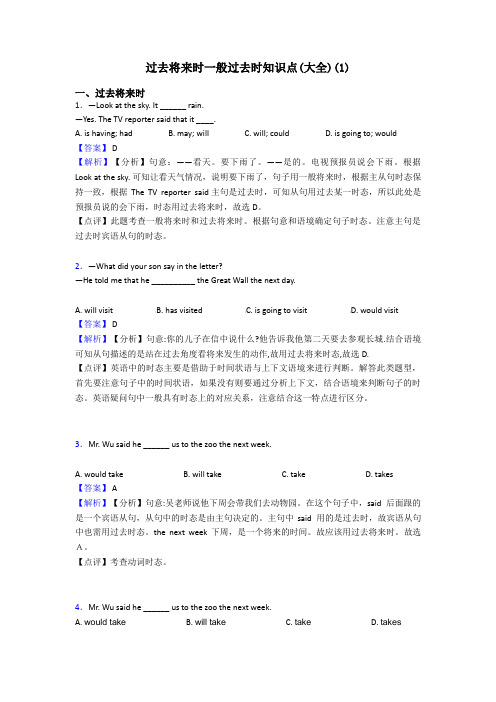
过去将来时一般过去时知识点(大全)(1)一、过去将来时1.—Look at the sky. It ______ rain.—Yes. The TV reporter said that it ____.A. is having; hadB. may; willC. will; couldD. is going to; would【答案】 D【解析】【分析】句意:——看天。
要下雨了。
——是的。
电视预报员说会下雨。
根据Look at the sky. 可知让看天气情况,说明要下雨了,句子用一般将来时,根据主从句时态保持一致,根据The TV reporter said主句是过去时,可知从句用过去某一时态,所以此处是预报员说的会下雨,时态用过去将来时,故选D。
【点评】此题考查一般将来时和过去将来时。
根据句意和语境确定句子时态。
注意主句是过去时宾语从句的时态。
2.—What did your son say in the letter?—He told me that he __________ the Great Wall the next day.A. will visitB. has visitedC. is going to visitD. would visit【答案】 D【解析】【分析】句意:你的儿子在信中说什么?他告诉我他第二天要去参观长城.结合语境可知从句描述的是站在过去角度看将来发生的动作,故用过去将来时态,故选D.【点评】英语中的时态主要是借助于时间状语与上下文语境来进行判断。
解答此类题型,首先要注意句子中的时间状语,如果没有则要通过分析上下文,结合语境来判断句子的时态。
英语疑问句中一般具有时态上的对应关系,注意结合这一特点进行区分。
3.Mr. Wu said he ______ us to the zoo the next week.A. would takeB. will takeC. takeD. takes【答案】 A【解析】【分析】句意:吴老师说他下周会带我们去动物园。
人教版初三英语过去将来时句子转一般过去时练习题20题含答案解析
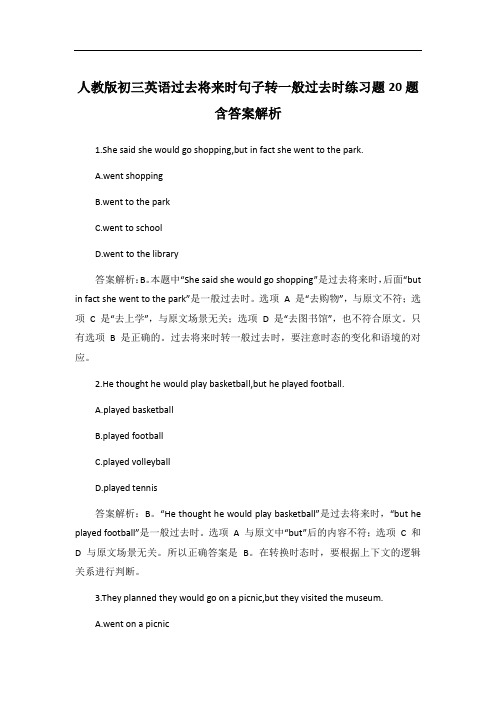
人教版初三英语过去将来时句子转一般过去时练习题20题含答案解析1.She said she would go shopping,but in fact she went to the park.A.went shoppingB.went to the parkC.went to schoolD.went to the library答案解析:B。
本题中“She said she would go shopping”是过去将来时,后面“but in fact she went to the park”是一般过去时。
选项A 是“去购物”,与原文不符;选项C 是“去上学”,与原文场景无关;选项 D 是“去图书馆”,也不符合原文。
只有选项 B 是正确的。
过去将来时转一般过去时,要注意时态的变化和语境的对应。
2.He thought he would play basketball,but he played football.A.played basketballB.played footballC.played volleyballD.played tennis答案解析:B。
“He thought he would play basketball”是过去将来时,“but he played football”是一般过去时。
选项A 与原文中“but”后的内容不符;选项C 和D 与原文场景无关。
所以正确答案是B。
在转换时态时,要根据上下文的逻辑关系进行判断。
3.They planned they would go on a picnic,but they visited the museum.A.went on a picnicB.visited the museumC.went to the zooD.went to the cinema答案解析:B。
“They planned they would go on a picnic”是过去将来时,“but they visited the museum”是一般过去时。
- 1、下载文档前请自行甄别文档内容的完整性,平台不提供额外的编辑、内容补充、找答案等附加服务。
- 2、"仅部分预览"的文档,不可在线预览部分如存在完整性等问题,可反馈申请退款(可完整预览的文档不适用该条件!)。
- 3、如文档侵犯您的权益,请联系客服反馈,我们会尽快为您处理(人工客服工作时间:9:00-18:30)。
过去将来时一般过去时中考经典题型带答案(1)一、过去将来时1.They made up their mind that they______ a new house once Larry changed jobs.A. boughtB. would buyC. have boughtD. had bought【答案】 B【解析】【分析】句意:他们打算只要Larry换了工作他们就买新房子。
once引导的是条件状语从句,根据主句将来时从句一般现在时的用法可知,从句一般过去时,主句应是一般将来时的过去时。
故答案选B。
【点评】考查动词时态,本题涉及过去将来时的应用。
2.Mr. Wu said he ______ us to the zoo the next week.A. would takeB. will takeC. takeD. takes【答案】 A【解析】【分析】句意:吴老师说他下周会带我们去动物园。
在这个句子中,said 后面跟的是一个宾语从句,从句中的时态是由主句决定的。
主句中said 用的是过去时,故宾语从句中也需用过去时态。
the next week 下周,是一个将来的时间。
故应该用过去将来时。
故选A。
【点评】考查动词时态。
3.—What did Alice say?—She said she me at eight o'clock tomorrow morning.A. is callingB. was callingC. will callD. would call【答案】 D【解析】【分析】句意:爱丽丝说了什么?——她说她明天上午八点钟给我打电话。
结合语境可知下文从句中描述的是站在过去角度看将来发生的动作,故用过去将来时态。
选D。
【点评】英语中的时态主要是借助于时间状语与上下文语境来进行判断。
解答此类题型,首先要注意句子中的时间状语,如果没有则要通过分析上下文,结合语境来判断句子的时态。
英语疑问句中一般具有时态上的对应关系,注意结合这一特点进行区分。
4.—Would you like to go boating with me?—Sure.________A. I'd likeB. I'd loveC. I'll be gladD. I'd love to【答案】 D【解析】【分析】—你想与我一起去划船吗?—当然,我乐意去。
I'd like后缺少了to;I'd love后面同样缺少to;I'll be glad 后缺少to;原句中would like to do sth.是愿意去做某事,回答的时候用I'd love/like to。
故选D。
【点评】此题考查日常用语would like 的用法。
回答I'd like to 或I‘d love to中to不能省略. 5.Tim told us that his company ______ robots to do some of the work.A. usesB. will useC. has usedD. would use【答案】 D【解析】【分析】句意:Tim 告诉我们他的公司将要使用机器人来做一些工作。
此题主句是过去时, 所以从句也必须是过去的某种时态, 采用排除法, 故选D。
【点评】过去将来时6.--- Has Wendy handed in her application form?--- Not sure. She told me that she wanted to check again and it in soon.A. will handB. would handC. has handedD. had handed【答案】 B【解析】【分析】句意:——Wendy交申请表了吗?——不太确信,她告诉我她在检查一下,很快就交。
soon通常是将来时的标志词,因为前面的wanted是过去式,故用过去将来时,因此选B。
【点评】考查过去将来时。
7.Did your father tell you that he ________ to Beijing on business next Monday?A. will goB. would goC. wentD. has gone【答案】 B【解析】【分析】句意:你的父亲告诉过你他下个星期一将要去北京谈生意吗?根据next Monday和 Did 可知,此句为过去将来时,结构为would do,故选B。
【点评】考查过去将来时用法。
过去将来时要用would来进行表达。
8.She a rest after long time's work two years ago.A. would haveB. will haveC. hasD. have【答案】A【解析】【分析】句意:两年前她长时间工作之后就会休息一会。
two years ago是过去时的时间状语,休息是长时间工作之后发生的事情,would+过去原形,表示过去习惯性的动作。
故选A。
【点评】考查would+动词原形表习惯性动作。
9.When I was a student,I my homework every night.A. doB. will doC. didD. would do【答案】D【解析】【分析】句意:当我还是个学生的时候,我每天晚上做作业。
When引导时间状语从句,从句用一般过去时,主句用过去将来时,would+动词原形,表示过去习惯性的动作。
故选D。
【点评】考查would+动词原形表习惯性动作。
10.—Do you worry about the final exam?—Yes, but Mr. Wang promised that he everything in his power to help us.A. doesB. didC. is doingD. would do【答案】 D【解析】【分析】句意:——你担心期末考试吗?——是的,但是王先生承诺他会尽全力帮助我们。
A.does做,B.did做,C.is doing正在做,D.would do将会做。
根据句子结构可知,此处用了过去将来时,故填入would do,故选D。
【点评】考查了过去将来时,注意would do的用法。
11.Mr. Wang said he ______ us ______ for another two weeks.A. will allow; to workB. will allow; workC. would allow; to workD. has allowed; work 【答案】 C【解析】【分析】句意:王先生说他将允许我们再工作两周。
根据句子结构可知,这是含有宾语从句的主从复合句,主句的谓语动词是said,是过去时,故从句也要用过去的某种时态;从句的时间状语是for another two weeks,又两周,所以从句是将来时,故用过去将来时,所以第一个空填would allow;另外第二个空allow sb. to do sth.允许某人做某事,固定短语,故选C。
【点评】此题考查宾语从句和固定短语。
注意从句的时态和allow sb. to do sth.固定短语。
12.She said that she ______to the Zoo the next Sunday.A. will goB. is goingC. would goD. has gone【答案】 C【解析】【分析】句意:她说她下周星期天去动物园。
A.一般将来时;B.一般将来时;C.过去将来时;D.现在完成时。
去动物园还没发生,用将来时,根据时间状语the next Sunday 可知,用过去将来时,would go,故选C。
【点评】考查动词的时态。
注意过去将来时的用法。
13.I go out to have a walk when they opened the door.A. am about toB. was about toC. went toD. have to【答案】 B【解析】【分析】句意:他们开门时我正要出去散步。
根据句意,可知我还没有出去,是打算出去散步,故排除C和D,又因为when后用的是一般过去式,故句子要用一般过去式,”be about to do sth将要做某事“的过去将来时为was/ were about to,主语I,故用be 动词was,因此选B。
【点评】考查过去将来时。
注意识记be about to do sth的用法。
14.Sina said she ______ to school the next Sunday.A. wouldn't goB. isn't goC. didn't goD. won't go【答案】 A【解析】【分析】句意:希娜说她下周日不想去学校了.结合语境可知从句中描述的是站在过去角度看将来发生的动作,故用过去将来时态,选A.【点评】英语中的时态主要是借助于时间状语与上下文语境来进行判断。
解答此类题型,首先要注意句子中的时间状语,如果没有则要通过分析上下文,结合语境来判断句子的时态。
英语疑问句中一般具有时态上的对应关系,注意结合这一特点进行区分。
15.Kate said that she _____________ us as soon as she got home.A. calledB. callsC. will callD. would call【答案】 D【解析】【分析】句意:凯特说她一到家就打电话给我们。
分析句子结构可知,此处是宾语从句,主句时态为一般过去时,从句时态根据主过从过原则可知,从句应该用相对应的过去时;再根据从句结构可知,从句为as soon as引导的条件状语从句,时态根据主将从现原则,主句用一般过去时,从句应该用过去将来时,用would do形式,故选D。
【点评】考查宾语从句和条件状语从句的时态。
注意宾语从句的时态为主过从过原则,条件状语从句时态为主将从现原则。
16.She gave me a determined look—the kind that said she ______ her mind.A. didn't changeB. hadn't changedC. wouldn't changeD. won't change【答案】 C【解析】【分析】句意:她给了我一个坚定的表情,这个表情表明她不会改变主意。
本句考查宾语从句的时态,结合语境“她不会改变主意”还未发生,应用一般将来时,再结合宾语从句时态要求:主句是过去时从句应用过去的某种时态,故用过去将来时,选C。
